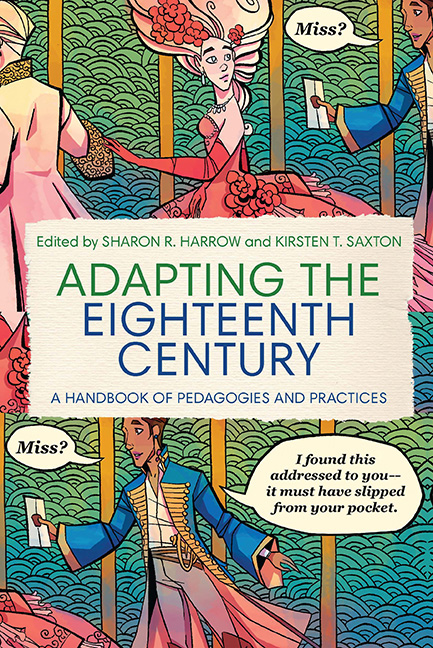Book contents
- Frontmatter
- Dedication
- Contents
- Acknowledgments
- Introduction
- 1 “Je suis Voltaire,” or, Appropriating the Philosophe in the Social Media Age
- 2 “Who Lives, Who Dies, Who Tells Your Story?”: The Uses of Hamilton in Special Collections Pedagogy and Public Engagement
- 3 Performing Frankenstein in the South: Sex, Race, and Science across the Disciplines
- 4 French Fairy Tales and Adaptations in the Twenty-First-Century Classroom
- 5 Select Trials at the Sessions-House in the Old-Bailey (1742) and Mark Ravenhill’s Mother Clap’s Molly House (2001)
- 6 Teaching with The Pilgrim’s Progress Video Game
- 7 Eliza Haywood’s “Bad Habits”: Teaching Adaptations of Fantomina: or, Love in a Maze and The Distress’d Orphan; or, Love in a Madhouse
- 8 Teaching Eighteenth-Century Literature through Eighteenth- Century Adaptations: Adaptive Structures
- 9 “A Private Had Been Flogged”: Adaptation and the “Invisible World” of Jane Austen
- 10 Fifty Shades of Pamela in the Undergraduate Classroom
- 11 Teaching the Austen-Monster-Mashup: Sense and Sensibility and Sea Monsters
- 12 Learning to Adapt: Teaching Pride and Prejudice and Its Adaptations in General Education Courses
- 13 Race and Romance: Adapting Free Women of Color in the Long Eighteenth Century
- 14 The Crusoeiana: Material Crusoe
- 15 Adaptation in Strange Places: Terrence Malick’s To the Wonder and the Narrative Effect and Form of Samuel Richardson’s Pamela
- 16 Adapting the Tombeaux des Princes: A Study in Media Variations
- 17 Experiential Pedagogy to Join the Thread of Conversation with Paul et Virginie
- 18 “Lookin’ for a Mind at Work”: Hamilton, Adaptation, and Enlightenment Ideals for the Core Curriculum
- Notes on the Contributors
- Index
17 - Experiential Pedagogy to Join the Thread of Conversation with Paul et Virginie
Published online by Cambridge University Press: 26 April 2020
- Frontmatter
- Dedication
- Contents
- Acknowledgments
- Introduction
- 1 “Je suis Voltaire,” or, Appropriating the Philosophe in the Social Media Age
- 2 “Who Lives, Who Dies, Who Tells Your Story?”: The Uses of Hamilton in Special Collections Pedagogy and Public Engagement
- 3 Performing Frankenstein in the South: Sex, Race, and Science across the Disciplines
- 4 French Fairy Tales and Adaptations in the Twenty-First-Century Classroom
- 5 Select Trials at the Sessions-House in the Old-Bailey (1742) and Mark Ravenhill’s Mother Clap’s Molly House (2001)
- 6 Teaching with The Pilgrim’s Progress Video Game
- 7 Eliza Haywood’s “Bad Habits”: Teaching Adaptations of Fantomina: or, Love in a Maze and The Distress’d Orphan; or, Love in a Madhouse
- 8 Teaching Eighteenth-Century Literature through Eighteenth- Century Adaptations: Adaptive Structures
- 9 “A Private Had Been Flogged”: Adaptation and the “Invisible World” of Jane Austen
- 10 Fifty Shades of Pamela in the Undergraduate Classroom
- 11 Teaching the Austen-Monster-Mashup: Sense and Sensibility and Sea Monsters
- 12 Learning to Adapt: Teaching Pride and Prejudice and Its Adaptations in General Education Courses
- 13 Race and Romance: Adapting Free Women of Color in the Long Eighteenth Century
- 14 The Crusoeiana: Material Crusoe
- 15 Adaptation in Strange Places: Terrence Malick’s To the Wonder and the Narrative Effect and Form of Samuel Richardson’s Pamela
- 16 Adapting the Tombeaux des Princes: A Study in Media Variations
- 17 Experiential Pedagogy to Join the Thread of Conversation with Paul et Virginie
- 18 “Lookin’ for a Mind at Work”: Hamilton, Adaptation, and Enlightenment Ideals for the Core Curriculum
- Notes on the Contributors
- Index
Summary
It is a challenge to bring an eighteenth-century French novel into the “learn- ing community” of a third-year university classroom for a French studies curriculum in the Anglophone province of Ontario. In her 2014 disserta- tion on experiential learning, Jennifer Niester-Mika noted the difficulty of bringing together students who come “from an array of backgrounds.” In the multicultural classroom of Canada, we cannot count on shared popular culture, and we are, in effect, in “a world in which every utterance has an infinite plurality of meaning” for a variety of reasons—including a limited control of (French) language, which sometimes results in misunderstand- ings and occasional reluctance to engage in class conversation. This chapter shares how I used experiential pedagogy successfully to teach Jacques-Henri Bernardin de Saint-Pierre's 1788 novel Paul et Virginie to achieve my goal to have the class join the conversation, while fostering student investment in cultural items, such as the library display of eighteenth- and nineteenth- century paper books. North American libraries generously grant free access to very old books, which allows students to experience their weight, tex- ture, print, paper quality, and luxurious bindings. However, the fact that they were locked away in a glass case for the library exhibit seemed to give them a daunting aura, so I sent students on a quest to locate other cultural objects relevant to the novel. For instance, students located hopscotches and labyrinths in their own town (we found one labyrinth on campus; it was a modern expression of an old practice). We also considered the way in which gardening in the novel compares with students’ own relationship to seeds and plants, so that they understood the novel as reflecting familiar daily activities. One enduring cultural activity is the consumption of romance novels that have tragic endings. The novel central to this experiment, the lowbrow and popular Paul et Virginie, bears some resemblance to the 1997 blockbuster Titanic because of the common tropes of forbidden love and heroic deeds, and the grand finale of a sinking ship in catastrophic weather conditions. These multiple points of access to the novel invite a pedagogical strategy that makes use of experiential learning and adaptation to strengthen critical thinking and cultural awareness.
- Type
- Chapter
- Information
- Adapting the Eighteenth CenturyA Handbook of Pedagogies and Practices, pp. 269 - 281Publisher: Boydell & BrewerPrint publication year: 2020



